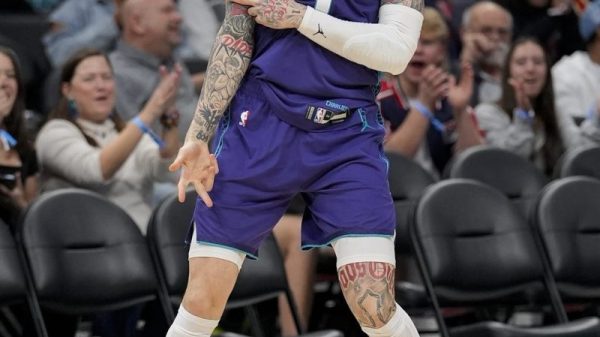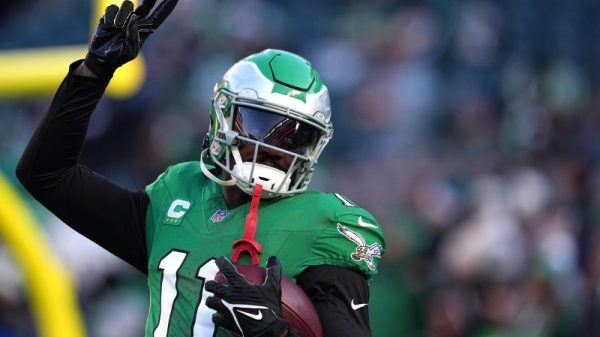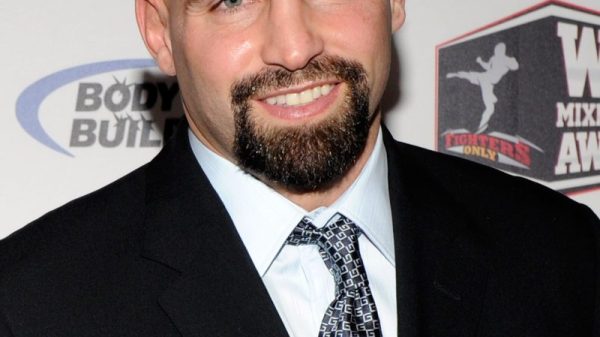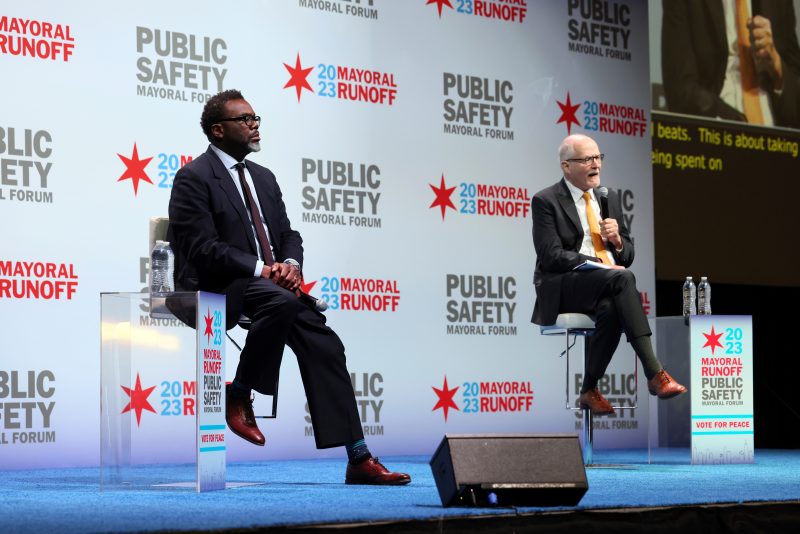CHICAGO — Polls closed in the competitive mayoral contest on Tuesday, concluding a dramatic election that ousted the incumbent and left Chicagoans with two very distinct choices to the run city.
Democrats Paul Vallas, 69, a former Chicago schools executive, and Brandon Johnson, 47, a Cook County commissioner, made their final pitches at polling sites, at one point missing each other by 30 minutes at Manny’s Deli, the South Loop cafeteria where Election Day visits are a political tradition.
The candidates, who offer dramatically different visions for leading the nation’s third-largest city, sought to turn out voters from their respective multiracial coalitions for the runoff, which historically draw low participation. The Chicago Board of Elections reported that slightly less than 30 percent of the electorate had voted as of 5 p.m. local time.
The city was also under a severe weather forecast throughout the day. The worst of it mostly missed the city, though heavy winds, storms and rain was scattered throughout the day as voters scurried to polling places under ominously gray skies.
“Look, I think this race is going to be determined by turnout,” Vallas said during his lunchtime visit to Manny’s. “You know, there’s going to be a lot of undecided vote, so it’s really hard to say it’s if it’s going to be determined tonight.”
Vallas entered the race as the front-runner, taking first place with nearly 33 percent of the vote in a nine-candidate field in February’s general election, in which he and Johnson both received more votes than incumbent Mayor Lori Lightfoot. But he has seen his 11-point lead over Johnson shrink in recent weeks. A March 28 poll by Northwestern University showed the candidates in a dead heat, each with 44 percent of the vote.
Whoever wins is going to face a major challenge in bringing the city together after such a heated race, said Tom Bowen, a longtime Democratic operative and principal and co-founder of New Chicago Consulting.
“There’s some inflammatory rhetoric coming from both sides on how bad the world will be if their preferred candidate loses. That’s not what’s really going to happen but they have whipped themselves into a fury about it and that’s the polarized partisan environment we live in today,” Bowen said. “So, what happens next is a lot of anger in much the same way that Donald Trump and Joe Biden never could really have a honeymoon period. The same thing will happen for the next Chicago mayor.”
Vallas appeared at ease as he bantered with panelists on a local talk-radio program broadcasting from the restaurant. He shook hands with prominent political figures who had endorsed him in the race, including former Illinois secretary of state Jesse White.
He took one of his final campaign stops to remind voters of a theme he has hit for the past five weeks: “There is no substitute for experienced, accomplished leadership. It’s as simple as that,” he said.
A half-hour later, Johnson appeared with a large cohort of labor supporters and liberal politicians, including Cook County Board President Toni Preckwinkle, who oversees the body on which Johnson serves.
Preckwinkle was optimistic about Johnson’s chances Tuesday, saying his “laser focus on equity” that he brought to the board in 2018 is the right direction for the city. Preckwinkle, who made history as one of two Black women in a 2019 runoff against Lightfoot, said she didn’t have any advice for Johnson.
“Because he’s going to win, and I didn’t,” she said with a laugh.
Former Chicago alderman Bob Fioretti, who is supporting Vallas, lingered after his candidate left to greet friends who were stumping for Johnson. Fioretti said despite the often divisive campaign rhetoric this season, both candidates offer solid options for voters and said the city would do well under whoever wins. But it’s Vallas’s centrist ideas on budget and taxes, he said, that are more in line with where the city’s voters are moving this cycle.
“There’s a change in this country. And it doesn’t matter that people were very liberal in the last few elections … it’s moving into a position of reform, tightening budgets,” Fioretti said.
Ticking off the challenges that lie ahead of the next mayor, including negotiating new police and teacher contracts, closing a budget shortfall, revitalizing downtown and curbing crime, Fioretti said there’s one thing the winner could benefit from: “Somebody better have a magic wand.”
The candidates’ stark differences in the first round were underscored by their highest-profile backers: For Johnson, the powerful, liberal Chicago Teachers Union (CTU), with which he is an organizer, and for Vallas, the Fraternal Order of Police. The next mayor will have to work with both groups in the coming round of contract negotiations and will be in charge of appointing the next public school CEO and police superintendent.
Both campaigns have highlighted their strong ground game as they scramble for the 50 percent of voters who didn’t pick either of them in the first round.
Vallas and Johnson both performed strongest with White voters in the general election, and the two are racing to lock up the Black voters who overwhelmingly backed Lightfoot, eliminated in the general after placing third, and the Latino majority who backed Rep. Jesús “Chuy” García (D-Ill.), the fourth-place finisher. Lightfoot was the first incumbent in 40 years to lose after a first term.
Both campaigns have touted expansive field efforts like door knocking and phone banking, but turnout lagged by late afternoon Tuesday in wards that had the highest number of voters who picked neither Johnson nor Vallas in the first round.
Rodney Washington, 53, felt ambivalent about his choices as he left his polling site in the 28th Ward in West Garfield Park. He declined to say who he voted for, but said his preferred candidate did not make the runoff; in his precinct, 78 percent of voters backed a candidate other than Johnson or Vallas, according to a WBEZ data analysis.
Taxes, schools and safety were Washington’s top issues, but he criticized both campaigns as having “too much noise” around their positions.
“I voted for the lesser of two evils,” Washington said.
Chicago’s mayoral elections are officially nonpartisan, but all candidates this year ran as Democrats. During the general election, Johnson established himself as the most liberal choice, while Vallas was viewed as the most conservative candidate.
Both have since moved their messages closer to the center, particularly on the contest’s most dominant theme: crime.
Rameen Chapman, 43, said it was a relatively easy choice for him to back Johnson. He remembers Vallas’s time as head of Chicago’s school system as “a mess” and was not persuaded by his tough talk on crime.
“It’s Chicago — there’s always going to be crime,” Chapman said. “You go back to every mayor of Chicago and crime is up and down, up and down. It just depends on the election cycle.”
Johnson has repeatedly distanced himself from past comments that were supportive of the movement to reduce police funding, while Vallas has pivoted to talking about holding criminals accountable to communities in a message that’s “less law-and-order focused,” said Jason DeSanto, a lecturer at Northwestern University’s Pritzker School of Law who studies political messaging, strategy and debate.
How voters decide Tuesday will reflect what DeSanto said is the overarching question in this race: “Can voters trust me?”
“Every argument ultimately goes to that question because voters aren’t going to watch every debate or know every issue; they’re too busy,” DeSanto said. “In this race, I think what that means for Vallas as far as trust is, ‘Does he reflect the values of the city?’ For Johnson, it’s, ‘Am I willing to give this newcomer a chance?’”
Millions of dollars have flowed into the race since 2022, with Vallas raising more than $17.6 million compared with Johnson’s more than $10 million, according to Illinois State Board of Elections records.
Vallas’s backers include wealthy people with a history supporting Republican candidates and causes like school privatization, while the bulk of Johnson’s support has come from CTU-aligned groups like the liberal United Working Families. The makeup of their donor bases has also fed into attack lines each has faced.
Vallas ran Chicago Public Schools from 1995 to 2001 and since then has served as the schools executive for districts in Philadelphia, New Orleans and Bridgeport, Conn., where he drew both criticism and praise for his leadership style and results.
Vallas ran Chicago Public School from 1995 to 2001 and since then has served as the schools executive for districts in Philadelphia, New Orleans and Bridgeport, Conn., where he drew praise and criticism for his track record. Johnson was a middle and high school teacher in Chicago before working as a union organizer and later as a commissioner for Cook County, where he has served since 2018.
The candidates and their surrogates have spent the past several days arguing why they would be the better mayor for the city.
At a lively rally Thursday at the University of Illinois at Chicago’s Credit Union 1 Arena, Martin Luther King III, Sen. Bernie Sanders (I-Vt.) and American Federation of Teachers President Randi Weingarten stumped for Johnson. They called him a candidate in touch with the lived experiences of Black and working-class Chicagoans who would take a populist approach to serving all citizens rather than just corporate interests.
Sanders said Johnson would holistically address safety in a way that was “smart and effective.”
“That means not only high-quality and non-racist law enforcement, it means that we must address the epidemic of mental illness, the epidemic of drug abuse, the epidemic of poverty and the epidemic of guns on the street,” Sanders told the crowd. “That is something that Brandon Johnson understands.”
Edward Bowman, 48, a resident from the Austin neighborhood on the city’s West Side said his father was murdered in the neighborhood in 1994 and he understands firsthand the effect of violent crime. He dismissed the idea that Johnson, who also lives in Austin, is ill-equipped to tackle the problem and embraced the candidate’s approach to invest in wraparound resources rather than more officers on the street.
“The answer to me is not more police; the police come, and the situation has already happened. What are they doing?” he said. “The answer to me is prevention: To get youth engaged and people engaged.”
“The past mayors and other regimes haven’t had a plan for youth. That’s why there’s so much going on with kids robbing people, jacking cars — that wasn’t happening 20 years ago,” Bowman said. “The youth need somebody to lead and direct and somebody who actually has a heart for them. When you hear Johnson talk, you can actually feel the love he has for the youth.”
Vallas, too, has sought to highlight his support of vulnerable groups while pushing back against attacks on his Democratic credentials with endorsements from high-profile Democrats like Sen. Richard J. Durbin (D-Ill.), former governor Pat Quinn and former Illinois congressman Bobby L. Rush.
During a North Side campaign stop at a restaurant Sunday, Vallas was flanked by influential Democratic and community leaders as he promised to protect liberal priorities like reproductive and LGBTQ rights. Vallas said he would “make Chicago a safe haven for anybody whose reproductive rights have been denied in other states” and praised the indictment of former president Donald Trump in New York as necessary for democracy before pivoting back to the race’s key theme of crime and safety.
Rush said only Vallas had the experience to navigate the difficult road ahead as the city faces issues like high crime, a housing affordability crisis and police reform.
“He’s the only one who, on day one, will be able to sit behind that desk on the fifth floor and know beyond a shadow of a doubt what he’s doing,” Rush said.
Deborah Cosey-Lane, a political coordinator and transit employee who previously worked on the Lightfoot campaign turned out for Vallas on Sunday after weighing the pros and cons of each candidate. She attended the event after a mutual friend of Vallas asked her to meet with the candidate and consider supporting him.
“I can’t sit on the fence. This election is too valuable and too vital,” Cosey-Lane said. She said she prayed about meeting with Vallas and found his answers on his political stances, public safety plans and other issues to be genuine.
“I probed him on these controversial issues like reproductive rights, public transit, whether he was a Republican or not. … I had to make sure I knew who I was going to back,” she said.
She also viewed Vallas as the candidate best positioned to carry out citywide investment strategies that began under Lightfoot, who as of Monday had not endorsed either candidate in the race.
Both campaigns have encouraged early or mail voting, the latter of which could lead to a delay in declaring a winner Tuesday if the margins are tight. Mail-in ballots, which must be postmarked by April 4, will be counted until April 18.
Sabrina Rodriguez and Colby Itkowitz contributed to this report.



























